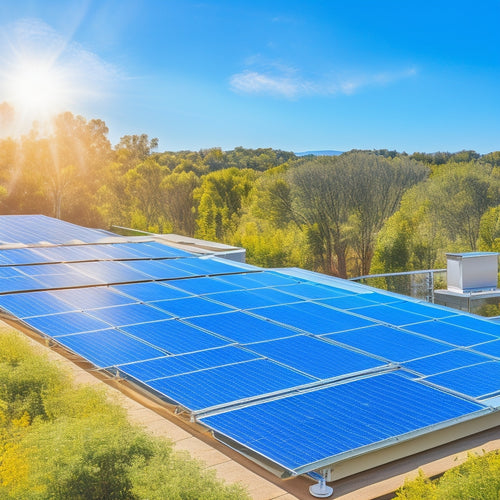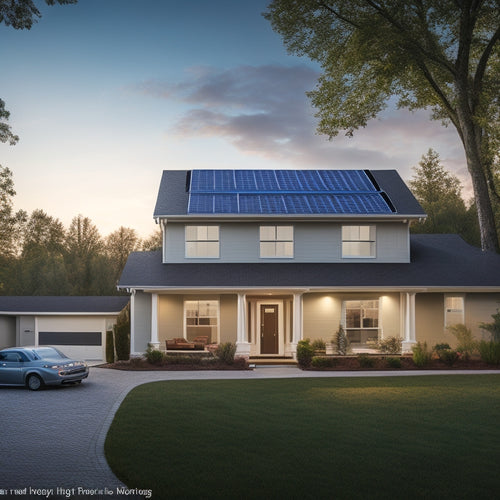
Solar Batteries for Home Solar Systems
Share
When considering solar batteries for your home solar system, you're taking an essential step towards energy independence and reduced reliance on the grid. By storing excess energy generated during the day for nighttime use, you'll reduce your energy bills and carbon footprint. Choosing the right battery is key, with options like lithium-ion offering high energy density and long lifespans, while lead-acid batteries provide a cost-effective alternative. Understanding your energy requirements and calculating your Ah capacity needs will guarantee you select the right battery for your system. As you investigate the world of solar batteries, you'll uncover the perfect solution to optimize your energy independence.
The Essentials
- Solar batteries store excess energy generated during the day for nighttime use, enhancing energy independence and reducing reliance on the grid.
- High-efficiency batteries like lithium-ion offer high energy density and long lifespans, making them ideal for maximizing energy storage and release.
- Solar batteries contribute to a significant reduction in carbon emissions, with solar energy able to reduce CO2 emissions by up to 78% compared to fossil fuels.
- Ah capacity measures a battery's energy storage capability, and higher Ah capacity allows for more power supply over extended periods.
- Regular battery monitoring and maintenance enhance lifespan and performance, with premium lithium-ion batteries requiring zero maintenance.
Energy Independence at Night
You've invested in a home solar system to capture the sun's energy, but what happens when the sun sets? Your solar panels don't generate power at night, so you need a way to store energy for later use.
With a solar battery, you can store excess energy generated during the day and use it to power your home after sunset, ensuring you have a steady supply of clean energy around the clock.
Power After Sunset
As the sun sets, your home's solar panels cease to generate electricity, leaving you reliant on the grid or diesel generators to power your evening activities. This can be a major drawback for homeowners who want to maximize their energy independence.
However, with the right solar battery system, you can continue to power your home long after the sun goes down. By incorporating a solar storage system into your home's solar setup, you can store excess energy generated during the day for use at night, reducing your reliance on the grid and increasing your overall energy independence, much like achieving off-grid energy storage.
Additionally, a reliable Solar Energy Storage solution can also alleviate the burden of high energy bills and reduce grid dependence, providing users with greater energy independence and potential cost savings.
The key to a successful solar storage system lies in battery efficiency. A high-efficiency battery can store more energy and release it when needed, ensuring you have power when you need it most.
Nighttime Energy Storage
With the sun dipping below the horizon, nighttime energy storage becomes essential for homeowners seeking true energy independence. As you shift from generating power during the day to relying on stored energy at night, you'll want to guarantee your solar battery system is up to the task.
By leveraging home energy storage systems, you can access the full potential of your solar panels and reduce your reliance on the grid. Additionally, with a reliable energy storage solution, you'll be protected from unpredictable power outages and rising energy bills.
When it comes to nighttime energy storage, you'll need to evaluate the type of solar battery that best suits your needs. Lithium-ion batteries, for instance, offer high energy density and long lifetimes, making them a popular choice for home solar systems.
Lead-acid batteries, on the other hand, are more cost-effective but may require more maintenance. Other energy storage technologies, such as flow batteries and sodium-ion batteries, are also emerging as viable alternatives.
As you evaluate your options, contemplate factors like depth of discharge, round-trip efficiency, and warranty periods. You'll want a solar battery that can efficiently store excess energy generated during the day and provide reliable power at night, guaranteeing you stay connected to the grid only when you choose to.
Reduced Carbon Footprint Guarantee
You're switching to a cleaner, eco-friendly energy source with solar batteries, which guarantee a reduced carbon footprint.
By utilizing renewable energy from the sun, you'll greatly lower your emissions today and contribute less to climate change.
Additionally, with residential solar energy solutions, you can optimize your energy efficiency and reduce your reliance on the grid.
This means you'll not only reduce your reliance on the grid but also minimize your environmental impact.
Eco-Friendly Energy Source
They're switching to solar power because it's an eco-friendly energy source that promises a reduced carbon footprint.
You're taking a significant step towards a sustainable future by choosing solar batteries for your home solar system. This sustainable technology utilizes renewable resources to generate electricity, making it a cleaner alternative to traditional fossil fuels.
By investing in solar power, you're contributing to a reduced reliance on non-renewable energy sources, which is essential for mitigating climate change. The reduced carbon footprint promise guarantees that your energy consumption doesn't harm the environment.
With solar power, you're not only reducing your carbon footprint but also promoting energy independence. You'll have more control over your energy usage, and you'll be less reliant on the grid.
Lower Emissions Today
By utilizing the power of solar energy, your home solar system guarantees a significant reduction in emissions today. With solar technology, you're not only generating clean energy but also contributing to a sustainable living environment. By switching to renewable energy, you're taking an essential step towards reducing your carbon footprint and mitigating the environmental impact of fossil fuels.
Here's a breakdown of the benefits of solar energy in reducing emissions:
| Benefits | Description |
|---|---|
| Carbon Reduction | Solar energy reduces CO2 emissions by up to 78% compared to traditional fossil fuels |
| Energy Efficiency | Solar systems optimize energy consumption, reducing waste and increasing energy independence |
| Climate Action | Renewable energy sources like solar power help combat climate change by reducing greenhouse gas emissions |
| Green Solutions | Solar technology provides eco-friendly alternatives to traditional energy sources, promoting sustainable living |
| Eco Innovation | Advances in solar energy drive innovation in green technologies, leading to a cleaner future |
Deep Cycle Battery Design
You're likely aware that a deep cycle battery's lifespan is critical to your home solar system's overall performance.
The cycle life expectancy of your battery, measured in the number of charge and discharge cycles it can handle, directly impacts its reliability and cost-effectiveness.
Additionally, with the increasing adoption of residential solar batteries, it's important to evaluate the construction materials used, such as lead-acid, lithium-ion, or nickel-cadmium, which also play a significant role in determining the battery's overall design and functionality.
Cycle Life Expectancy
Frequently, homeowners who invest in home solar systems overlook a crucial aspect of their setup: the cycle life expectancy of their deep cycle batteries. You shouldn't make the same mistake.
Cycle life expectancy refers to the number of charge and discharge cycles your battery can handle before its capacity degrades. A longer cycle life expectancy means your battery will last longer and require less maintenance.
When choosing a deep cycle battery, look for one with a high cycle life expectancy. This is especially important if you plan to use your solar system for off-grid or backup power applications.
Proper battery maintenance, such as keeping the battery charged between 20% and 80% capacity, can also help extend its cycle life. Additionally, verify your charging system is designed for high charging efficiency to minimize battery wear and tear.
Battery Construction Materials
When selecting a deep cycle battery for your home solar system, the construction materials and design play a critical role in determining its overall performance and lifespan.
You'll want to choose a battery type that suits your energy needs and budget. Flooded lead-acid batteries, for instance, are a popular choice due to their affordability and established manufacturing processes. However, they require regular maintenance and can be heavy.
On the other hand, sealed lead-acid batteries, such as AGM (Absorbed Glass Mat) and gel batteries, offer a maintenance-free design and are lighter, but at a higher cost.
The material benefits of each battery type should be carefully considered. AGM batteries, for example, use a special glass mat to absorb the acid, making them more durable and resistant to vibrations.
Gel batteries, on the other hand, use a gel-like substance to suspend the acid, allowing for a longer lifespan and improved performance.
Check Your Ah Capacity
You need to verify your solar battery has sufficient Ah capacity to meet your energy needs. Ah capacity, short for ampere-hours, measures a battery's energy storage capacity.
When designing a reliable backup power solution for your home, it's crucial to take into account renewable energy solutions that integrate seamlessly with your solar power batteries.
Now, let's investigate how to calculate your Ah needs and understand the importance of selecting the right capacity for your home solar system.
Ah Capacity Explained
Across various solar battery models, you'll come face-to-face with Ah capacity ratings, an essential metric that defines a battery's performance. Ah capacity, short for ampere-hours, measures a battery's capacity to store electrical energy. It represents the amount of electric current a battery can supply over a specific period. A higher Ah capacity means a battery can provide more power over a longer duration.
Understanding Ah capacity is vital when selecting a solar battery for your home solar system. It directly impacts the battery's ability to meet your energy demands during periods of low sunlight or power outages. Here's a breakdown of Ah capacity ranges and their typical applications:
| Ah Capacity Range | Typical Application |
|---|---|
| 100-200 Ah | Small off-grid systems, RVs, and boats |
| 200-400 Ah | Medium-sized off-grid systems, cabins, and small homes |
| 400-800 Ah | Large off-grid systems, homes, and commercial properties |
When evaluating solar batteries, consider your energy requirements and the Ah capacity needed to meet those demands. This will guarantee you choose a battery that provides the necessary power and backup during periods of low sunlight or grid outages.
Calculating Ah Needs
Determining your Ah needs is an essential step in selecting the right solar battery for your home solar system. You'll need to calculate the total Ah capacity required to meet your energy needs during periods of low sunlight or at night.
To do this, you'll need to perform a load analysis, which involves identifying the total wattage of all the appliances and devices you want to power. Start by making a list of all the devices you want to power, including their individual wattage ratings.
Next, determine how many hours you want your solar battery to provide power during the night or on cloudy days. Multiply the total wattage by the number of hours to get the total watt-hours (Wh) required.
Then, divide the Wh by the battery voltage to get the total Ah capacity necessary. For example, if you need 1000 Wh of power and your battery voltage is 12V, you'll need a battery with an Ah capacity of at least 83.3 Ah (1000 Wh / 12V).
Accurate battery sizing is critical to guarantee your solar battery meets your energy needs and lasts for years to come.
Longer Cycle Life Guaranteed
When you're selecting a solar battery for your home solar system, you want to make certain it's built to last.
That's why you should look for batteries with an extended cycle life guarantee, which promises a certain number of charge and discharge cycles before the battery's capacity drops below a specified threshold.
Extended Battery Durability
With a typical lifespan of around 5 to 7 years, traditional deep cycle batteries often fall short of meeting the long-term energy storage needs of modern homes. You need a reliable energy storage solution that can keep up with your energy demands. That's why extended battery durability is vital for your home solar system. By choosing a high-quality solar battery with advanced technology, you can enjoy a longer cycle life and reduced maintenance costs.
Here's a comparison of traditional deep cycle batteries and advanced solar batteries:
| Battery Type | Cycle Life | Maintenance |
|---|---|---|
| Traditional Deep Cycle | 5-7 years | Regular watering, equalization, and monitoring |
| Advanced Solar Battery | 10-15 years | Minimal maintenance, automatic monitoring |
| Advanced Solar Battery with BMS | 15-20 years | Zero maintenance, real-time monitoring |
| Lithium-Ion Solar Battery | 20-25 years | No maintenance, advanced monitoring |
| Premium Lithium-Ion Solar Battery | 25+ years | Zero maintenance, predictive analytics |
To maximize your solar battery's lifespan, it is important to follow proper battery maintenance tips and performance optimization strategies. This includes regular monitoring, keeping the battery away from extreme temperatures, and avoiding deep discharging. By doing so, you can enjoy a longer cycle life and reliable energy storage for your home.
Frequently Asked Questions
Can I Use Any Type of Battery for My Solar System?
You can't use just any battery for your solar system; you need ones designed for renewable energy systems, considering factors like battery types (lead-acid, lithium-ion, or saltwater) and lifespan (5-15 years) to guarantee peak performance and freedom from energy grid dependence.
How Often Should I Maintain My Solar Batteries?
You should check your battery's state of charge, voltage, and temperature regularly to maximize its lifespan; following maintenance tips like cleaning terminals and ensuring proper ventilation will also help you get the most out of your investment.
Are Solar Batteries Affected by Extreme Temperatures?
You'll find that extreme temperatures markedly impact battery efficiency, as high temps accelerate degradation and low temps reduce capacity, so it's essential to monitor and regulate temperature to guarantee ideal performance and extend your battery's lifespan.
Can I Add More Batteries to My Existing System Later?
You can expand your energy independence by adding more batteries to your existing system later, as long as you guarantee the new batteries match your system's compatibility and don't exceed its maximum battery capacity.
Are Solar Batteries Covered Under Warranty if I Misuse Them?
If you misuse them, you'll likely void the warranty, but it is crucial to review the warranty limitations, as they often cover manufacturing defects, not user error, which can greatly impact your battery lifespan and overall system performance.
Final Thoughts
As you utilize the power of solar energy, remember that solar batteries are the key to revealing true energy independence. By storing excess energy generated during the day, you'll have a reliable supply at night, reducing your reliance on the grid. And with a deep cycle battery design, you can rest assured that your carbon footprint will shrink. So, check your Ah capacity and reap the benefits of a longer cycle life - a guarantee that your investment will pay off for years to come. After all, isn't energy independence worth banking on?
Related Posts
-

What Do I Need to Know About Farm Solar Panels
When considering farm solar panels, you need to assess costs, benefits, and technical specifics. Initial investment c...
-

What Types of Solar Energy Devices Are Available
You'll find several types of solar energy devices available today, each customized to different energy needs. Photovo...
-

Cost of Solar With Battery Backup
You're investing in a solar panel system with battery backup to guarantee reliable power during outages. The cost of ...


